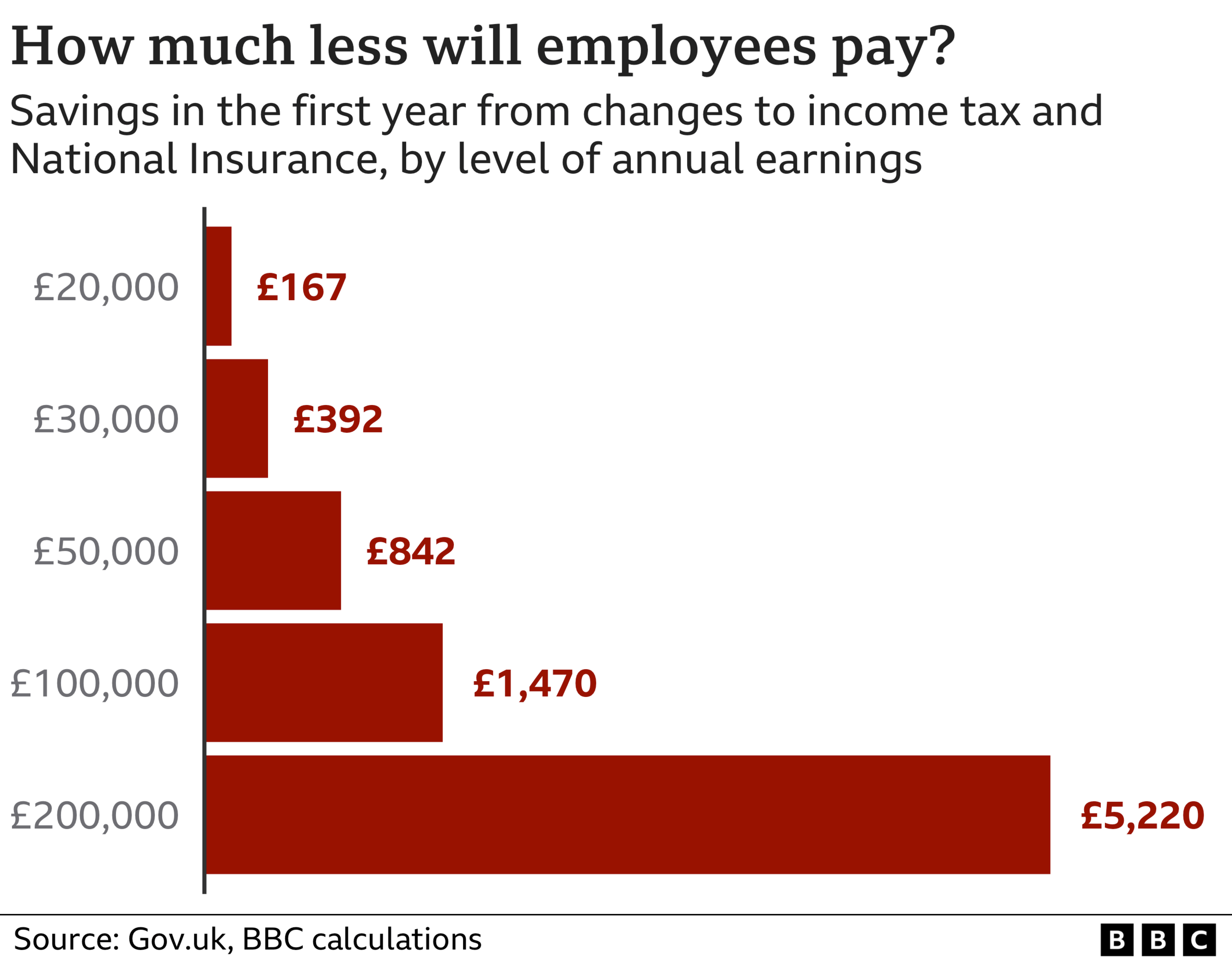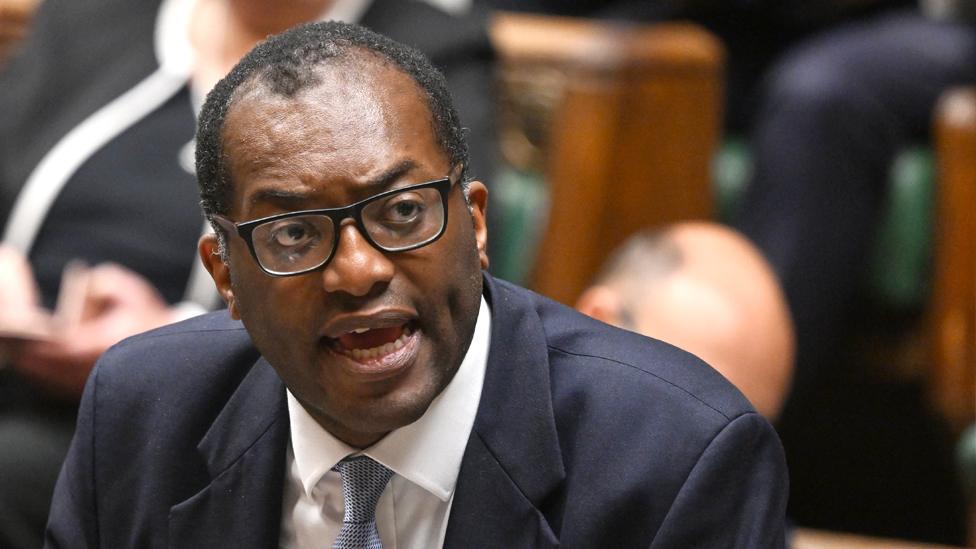Chancellor Kwasi Kwarteng hails 'new era' as he unveils tax cuts
- Published
Watch: Stamp duty to income tax - What to know about Kwarteng's 'new era'
Chancellor Kwasi Kwarteng has unveiled the biggest package of tax cuts in 50 years, as he hailed a "new era" for the UK economy.
Income tax and the stamp duty on home purchases will be cut and planned rises in business taxes have been scrapped.
Mr Kwarteng said a major change of direction was needed to kick start economic growth.
But Labour said it would not solve the cost-of-living crisis and was a "plan to reward the already wealthy".
It comes as the Bank of England warns the UK may already be in recession.
The pound sank to a fresh 37-year low against the dollar as the chancellor gave his statement.
In a departure from Boris Johnson's economic policies, Mr Kwarteng has scrapped plans to push up taxes to pay for public services, with the aim of boosting economic growth.
In a Commons statement, being dubbed a mini-budget, he said high tax rates "damage Britain's competitiveness", reducing the incentive to work and for businesses to invest.
He announced that the basic rate of income tax would be reduced by one percentage point to 19% in April - one year earlier than planned.
He also unveiled a cut to the top rate of income tax from 45% to 40%, meaning the UK will have a single higher rate from April.
Other measures include:
The threshold people in England and Northern Ireland start paying stamp duty on home purchases will rise to £250,000
For first-time buyers the threshold will rise to £425,000 and the value of the property they can claim relief will increase from £500,000 to £625,000
Planned increases in the duty rates for beer, cider, wine and spirits will be axed
The cap on bankers' bonuses will be lifted
New investment zones, where business will benefit from tax cuts and planning rules will be relaxed to encourage house building, will be established
Mr Kwarteng fulfilled promises to reverse the rise in National Insurance payments introduced by Mr Johnson to pay for social care and tackle the NHS backlog.
He confirmed a planned corporation tax increase from 19% to 25% would also be scrapped.

The total cost of the permanent tax cuts announced by the chancellor are estimated at almost £45bn by 2027, which the chancellor said would "turn the vicious cycle of stagnation into a virtuous cycle of growth".
"We need a new approach for a new era, focused on growth," he added.
Government borrowing will increase by £72bn as a result of the announcements, according to the Treasury.
The changes to income tax do not apply in Scotland but cuts to corporation tax and national insurance are UK-wide.
Paul Johnson, director of the independent Institute for Fiscal Studies, said the statement amounted to the biggest tax cuts since the 1972 Budget, with the cuts 50% bigger than had been expected.
He said that the UK could be borrowing £120bn in three years' time to afford the measures.
Mr Johnson added that the plans were a "big gamble", with money being pumped into the economy when inflation remains high. However, he said they were "manageable" if economic growth "really picks up".


This is not a mini-budget. This is a radical tax-cutting economic intervention, which is a significant change of course.
Boris Johnson's tax plans have been junked. Many households will save some money, but some of the biggest tax cuts will be for those with the biggest salaries.
And this will cost a lot of money.
The chancellor's calculation is that it's worth it. People need help with bills and slashing tax will stimulate growth. If you grow the economy, there will be more tax raised and that will help pay the debt in the medium term.
But many are sceptical it will work.
Senior Conservatives have been warning for months that the strategy is wrong and will saddle future generations with debt.
Opposition parties believe the government has the wrong priorities with tax cuts for the wealthy and should be raising more money from a windfall tax on energy company profits.
The Treasury hasn't said when it expects to achieve its desired economic growth.
But the chancellor is determined to press ahead with a radical change of direction. The big question now: will it work?

Labour described his statement as "an admission of 12 years of economic failure".
"The Conservatives cannot solve the cost-of-living crisis, the Conservatives are the cost-of-living crisis, and our country cannot afford them anymore," shadow chancellor Rachel Reeves said.
"The chancellor has made clear who his priorities are today. Not a plan for growth. A plan to reward the already wealthy. A return to the trickle-down of the past. Back to the future, not a brave new era."
Lib Dem leader Sir Ed Davey said: "This was the billionaire's budget, showing the Conservatives are completely out of touch with families struggling to pay the bills."
Watch: Labour says Tories created 'vicious circle of stagnation'
The statement also included details of the cost of the government's plan to cap energy bills for households and businesses.
Mr Kwarteng said these estimated costs were "particularly uncertain, given volatile energy prices" but based on recent prices the total cost of the package for the six months from October was expected to be around £60bn.
"We expect the cost to come down as we negotiate new, long-term energy contracts with suppliers," he added.
The government normally releases an independent forecast of how major tax changes will impact the economy, but Mr Kwarteng has opted not to do this, as his statement is not technically a Budget.
However, Mr Kwarteng promised the Office for Budget Responsibility would publish a full economic forecast before the end of the year, with a second to follow in the new year.
The huge increase in borrowing comes at a time when inflation - the rate at which prices rise - is at a 40-year high, leading to higher interest payments.
On Thursday the Bank of England raised interest rates from 1.75% to 2.25% - the highest level for 14 years - in an attempt to cool soaring prices.
A not-so-mini-budget: What’s it all about?

What are your questions on the cost of living crisis? What would you like to know about the chancellor's mini-budget? Send your questions to yourquestions@bbc.co.uk, external.
You can also send your questions in the following ways:
WhatsApp: +44 7756 165803
Tweet: @BBC_HaveYourSay, external
Or fill out the form below
Please read our terms & conditions and privacy policy
If you are reading this page and can't see the form you will need to visit the mobile version of the BBC website to submit your question or comment or you can email us at YourQuestions@bbc.co.uk, external. Please include your name, age and location with any submission.

Related topics
- Published23 September 2022

- Published2 April

- Published22 September 2022

- Published21 September 2022
